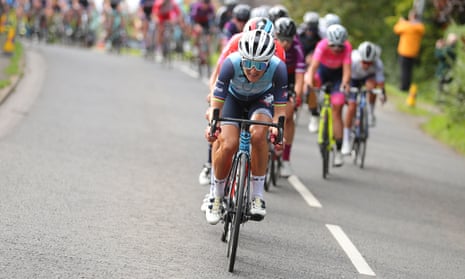British Cycling has named the host towns for this summer’s Tour of Britain Women after what has been described as “monumental effort” to make sure the race goes ahead.
Ten weeks after the Guardian reported the governing body would organise the race in-house following the collapse of SweetSpot group, the outline of the route has been unveiled, with an opening stage starting in Welshpool and finishing in Llandudno on 6 June.
Stage two will start and finish in Wrexham, stage three will begin and end in Warrington, and the final stage will start outside the National Cycling Centre in Manchester and finish in Leigh on 9 June.
This year’s race will be limited to four stages – down from six for the previous edition of the Women’s Tour in 2022 – due to the time restrictions British Cycling has faced, but there is an ambition to grow in the future.
Rod Ellingworth, the former deputy team principal of the Ineos Grenadiers who joined as race director last month, said: “It’s been a monumental effort by the whole team over the past 10 weeks to confirm the stages for this year’s Tour of Britain Women.”
The governing body’s chief executive, Jon Dutton, admitted there had been “many” moments in the last 10 weeks where he feared the race might not take place. “I dare say with 52 days to go there will be a few more bumps in the road,” Dutton said.
“We’ve had local authorities, start towns and finish towns who’ve said: ‘We’re in’ and then subsequently said: ‘We’re not in’ and that’s difficult. We’ve always had the idea of a condensed, compact race and when one pulls out that’s an issue across the board.”
British Cycling is also working on the men’s Tour of Britain, with that race due to take place over six days in September rather than the usual eight.
Dutton added that British Cycling is continuing to seek further investment for what he described as two “expensive races”. Much of the money will come from hosting fees and broadcast contracts, close to being agreed but not yet finalised, but there is a need for more commercial revenue.
All six of the UK’s UCI Continental level teams have signed up for the women’s race, and the former world champion Lizzie Deignan will swap her Lidl-Trek jersey for Britain colours to lead a national squad.
after newsletter promotion
“Sometimes it’s easy to underestimate how much it takes to put on a race so I’m really grateful to the people who have pulled it off against the odds,” Deignan said.
The 35-year-old wants to use the race to prepare for a busy summer which will hopefully include the Paris Olympics, but admitted the broken arm she suffered in a crash at last month’s Tour of Flanders had come at a bad time.
“The main concern for me is it’s during Olympic selection time so I’ve missed a good chunk of races I was peaking for in terms of getting selected,” said Deignan. “There’s plenty of time until the Olympics itself to get fit and ready, but selection is harder than it’s ever been so it’s obviously bad timing.”
